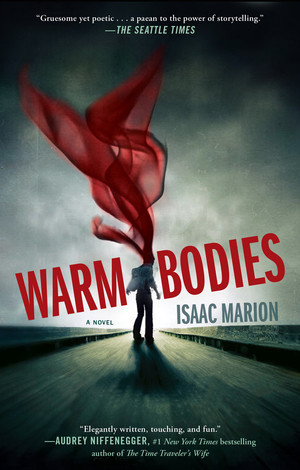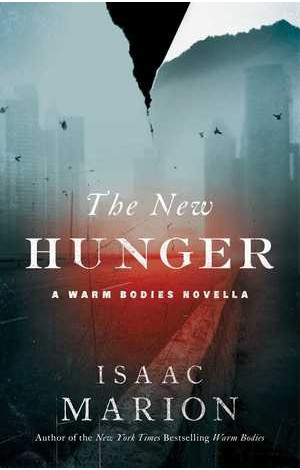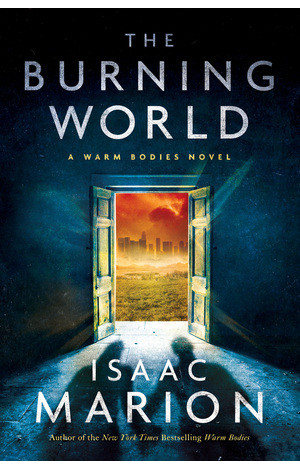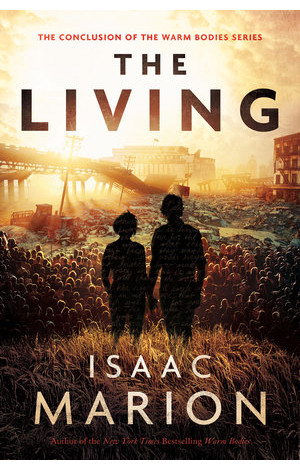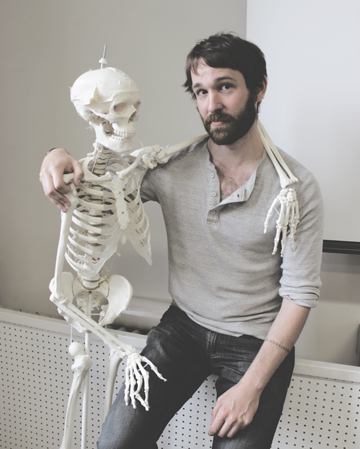
Please introduce yourself and your book(s)!
I’m Isaac Marion, author of the Warm Bodies series, which is a four-book story about a walking corpse rediscovering life, literally and figuratively, and his fight to revive the ruined world.
What is/are the real-life story(ies) behind your book(s)?
R’s struggle to reconnect with humanity and remember what it means to be alive was a pretty close mirror of my own struggle to emerge from depression. I wrote the first book during a very dark time in my life when I had lost all sense of identity and reason to live. Writing this story was part of my journey out of that pit, from the basic existential questions in the first book to more personal stuff in the later books. Okay, so you’re alive now, you have the spark again, but what do you do with it? How do you find your place in this world when you still really don’t know who you are? And even if you believe life is worth living, do you believe the world is worth saving? Can you expand your fight beyond yourself and try to imagine a better world for others too? The scope widens as the series progresses but it never stopped being personal to me.
What inspires/inspired your creativity?
For me, art is about connecting with others. It’s the thrill of making my inner world real and inviting others into it. When I was a kid and didn’t have any satisfying creative outlets, I felt so lonely inside my head. I was drowning in imagined imagery and feelings and stories, and I craved a way to release it all so that I could inhabit those worlds with other people. And not just “worlds” in the sense of fantasy realms—even a story about normal modern life can be its own world. There’s an incredible satisfaction in imagining people and places and moments so vividly that they feel real, and then “solidifying” them in the form of language so that you can walk around in there.
How do bad reviews and negative feedback affect you and how do you deal with them?
I don’t go looking for reviews. It’s such an emotional mine field and I generally try to avoid it, unless it’s a major publication and I need to know what they said for professional reasons. But I do bump into them sometimes. I can handle honest, thoughtful criticisms. Sometimes I even agree with them. The only ones that really bother me are the ones that are just unfair, bad-faith arguments, where you can tell the person didn’t really pay attention or went into it with a preconception that warped their whole experience. Reviews like that make me mad even when they’re not about my work, even when they’re about things I didn’t even like. The injustice! But for my own work, I have kind of a natural filtering process to avoid the really cruel or stupid reviews. I tread carefully and try to protect my soft heart. And sometimes I grit my teeth and take my lashings. But also, in most of my experiences, by the time the book is out in the world I’ve already been so thoroughly abused by my editors that my skin is pretty thick.
How has your creation process improved over time?
I’ve been learning to trust my instincts more and just let the first draft flow. I used to spend a LOT of time and sweat trying to plan out every little moment in advance. And while I was writing each chapter, I’d be constantly worrying about mechanical factors like pacing and structure, like I was trying to squeeze it into a pre-existing mold. I still think pacing and structure are important things to be aware of, but I’m learning to leave those concerns for the second draft so that the initial creative spark doesn’t get smothered. It’s a “use the Force” sort of feeling, like closing your eyes and just plunging in, trusting your subconscious to make something good happen. And then of course, later, you come back and clean up the mess!
What were the best, worst and most surprising things you encountered during the entire process of completing your book(s)?
The worst thing was also the most surprising thing, which was discovering how deeply committed people are to the idea of genres. I had always thought of genres as a vague set of labels that were frequently mixed and blurred, mildly helpful as a starting point but not something I would put all my faith in. I might not generally enjoy crime fiction, but say it’s an elegantly written murder mystery set in a near future where humanity has been replaced by robots, like Ariel S. Winter’s upcoming The Preserve? Well, now I might be interested. That’s how I think about genres. Just tell me about the story and the style and I’ll decide for myself if it’s for me. But trying to promote the Warm Bodies series, I realized just how seriously many people take those labels and how uninterested they are in looking any closer. My books happened to have two very polarizing labels attached to them—“zombie fiction” and “YA”, neither of which I embrace—so I was constantly struggling to get past people’s reflex reaction when they hear those trigger words. It always amused me that 9 out of 10 positive reviews would start with some variation on “I don’t usually like zombies but…” or “This isn’t my genre but…” But for every one of those that broke through their first reaction, I can’t imagine how many more walked away. That was frustrating.
Do you tend towards personal satisfaction or aim to serve your readers? Do you balance the two and how?
What an interesting question. I’ve actually been having a lot of arguments about this lately. A lot of writers and artists in general really bristle at the idea of considering their audience. There’s this very popular idea that you should only make art “for yourself” and it doesn’t matter what anyone else thinks of it. And I think there’s some truth to that but it gets distorted or overstated.
To me, art is communication. Art exists—art happens—in the shared space between creator and viewer. If I tell a story to an empty room and there’s no one there to hear my words and connect them with meanings in their heads, then was that really a story? Or just a bunch of noises vibrating air molecules? I think the audience is an essential element of creative expression, because if no one comprehends what I express, then I haven’t expressed anything. So I do think about the audience. I’m not going to write a story that’s nothing but inside jokes and private references that only I would understand. What would be the point of that? I consider how my language will be perceived and understood by other minds, because I’m trying to communicate. I’m trying to transfer images and ideas and feelings into other people’s heads, and if I refuse to spare a thought for what context and tools I might need to provide in order for a hypothetical stranger to understand me, then those transfers will fail, and I will have expressed nothing.
On the other hand, I absolutely do refuse to write for a SPECIFIC audience. And I think that’s maybe what a lot of people mean when they talk about writing for other people, the idea of altering your vision to be palatable to a particular demographic or to fit a particular market or even to please a particular person, like your spouse or your parents or whoever you feel judging you over your shoulder. So many writing gurus will say you MUST “write to market” or even fine-target a particular genre niche if you want to succeed…and they’re probably right! But I’d rather not be a writer at all than force myself to write like that. I have to write exactly what I’m interested in exactly the way that interests me, or it turns gray and disintegrates. But within that personal vision, there is room to consider “the audience” in a very general way, to decide what I want them to feel and consider how best to make them feel it.
What are your plans for future books?
I’m currently halfway through my first non-Warm Bodies novel, and it’s a pretty big departure. No zombies, no young adults, no epic struggles to save the world. I don’t want to talk about the central premise yet because too many of my ideas have been snatched out of the ether and put to use by faster writers, but it’s a much more laid-back, character-driven story, set in Seattle a few years from now, about a young musician couple and their bandmates struggling to adapt when a big technological change makes the world increasingly inhospitable to music. It’s less about high stakes action and drama and more about funny and flawed people navigating their relationships and trying not to go insane as humanity eagerly tramples its soul to get to the next cool gadget.
Tell us some quirky facts about yourself
Hmm, well… Left-handed. Lots of tattoos. I live alone with my cat in a log cabin in the woods 30 minutes from the nearest town on a remote Washington island. I am an occasional musician who released two albums in 2006 and 2007 and I plan to start another one this year. I also write poems and post them in little music videos on Instagram. Poetry on Instagram, I mean, how quirky is THAT, right?
